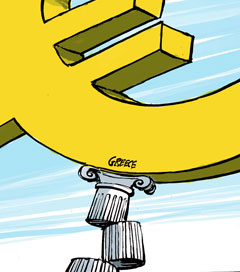Honest, paywall-free news is rare. Please support our boldly independent journalism with a donation of any size.
The reaction of European leaders and institutions to the Greek crisis is a sight to behold. Essentially, it boils down to the fact that default would be very inconvenient, both as a practical matter and in terms of prestige. Therefore, default must not be considered a possibility, even though it has long been obvious that nondefault is not an option.
So will they kick the can down the road once again? I don’t know. What I do know is that the costs of this strategy of delay are themselves badly misunderstood.
I keep seeing statements along the lines that delaying a full resolution of the Greek situation is costing hundreds of billions of euros, because estimates of the size of the needed financial rescue fund keep going up. But such calculations totally miss the point. The European Stabilization Fund isn’t a transfer program; it’s a credit line designed to provide struggling euro-zone nations with enough liquidity
to get past a temporary cash squeeze. Since that’s not the actual problem, the size of the fund is a measure of European delusion, not a bailout cost.
Click here to get Truthout stories like this one sent straight to your inbox, 365 days a year.
Nor is Greece like a Texas thrift in the 1980s, using deposit insurance plus deregulation to make ever bigger gambles, and thereby blowing up the eventual cost of the bailout.
So what are the real costs of kicking the can down the road? I’d say that you want to think of it two ways: the costs to Europe as a whole, including Greece, and the costs to Europe ex-Greece.
For Europe including Greece, the costs of delay are the real costs to the Greek economy: delaying a realistic resolution of the debt problem means extending the period of high unemployment and depressed output. Add up the cumulating Greek output gap, and there’s one estimate of the true cost of delay.
For Europe ex-Greece, the costs of delay are whatever that delay does to reduce the amount that Greece will eventually pay its creditors. I think there’s a good case to be made that at this point demands for even more austerity are counterproductive, even in terms of creditors’ interests: the Greek economy is suffering long-term damage, the Greek political scene is being radicalized, and the chances of Greece just telling its creditors to take a hike while it devalues the new drachma are rising.
In any case, what you have to ask now is what Europe is waiting for. Why will six months more of credit lines and suffering make the situation any better?
Truthout has licensed this content. It may not be reproduced by any other source and is not covered by our Creative Commons license.
Paul Krugman joined The New York Times in 1999 as a columnist on the Op-Ed page and continues as a professor of economics and international affairs at Princeton University. He was awarded the Nobel in economic science in 2008.
Mr Krugman is the author or editor of 20 books and more than 200 papers in professional journals and edited volumes, including “The Return of Depression Economics” (2008) and “The Conscience of a Liberal” (2007). Copyright 2011 The New York Times.
Holding Trump accountable for his illegal war on Iran
The devastating American and Israeli attacks have killed hundreds of Iranians, and the death toll continues to rise.
As independent media, what we do next matters a lot. It’s up to us to report the truth, demand accountability, and reckon with the consequences of U.S. militarism at this cataclysmic historical moment.
Trump may be an authoritarian, but he is not entirely invulnerable, nor are the elected officials who have given him pass after pass. We cannot let him believe for a second longer that he can get away with something this wildly illegal or recklessly dangerous without accountability.
We ask for your support as we carry out our media resistance to unchecked militarism. Please make a tax-deductible one-time or monthly donation to Truthout.
